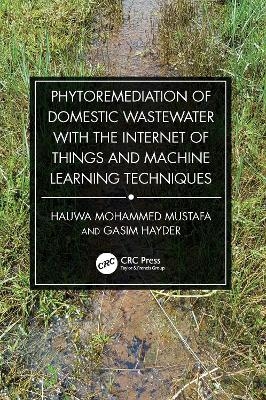
Phytoremediation of Domestic Wastewater with the Internet of Things and Machine Learning Techniques
CRC Press (Verlag)
978-1-032-41744-8 (ISBN)
Phytoremediation of Domestic Wastewater with the Internet of Things and Machine Learning Techniques highlights the most recent advances in phytoremediation of wastewater using the latest technologies. It discusses practical applications and experiences utilizing phytoremediation methods for environmental sustainability and the remediation of wastewater. It also examines the various interrelated disciplines relating to phytoremediation technologies and plots industry’s best practices to share this technology widely, as well as the latest findings and strategies. It serves as a nexus between artificial intelligence, environmental sustainability and bioremediation for advanced students and practising professionals in the field.
Hauwa Mohammed Mustafa is an Academic Lecturer in the Department of Pure and Applied Chemistry, Kaduna State University (KASU), Nigeria. She obtained her Doctorate Degree from Universiti Tenaga Nasional (UNITEN), Malaysia. Her research areas focus on Wastewater Treatment, Bioenergy, IoT, Artificial Intelligence, and Material Science. Gasim Hayder is a Senior Lecturer and the Head of the Water & Environmental Engineering Unit at the Civil Engineering Department, College of Engineering, Universiti Tenaga Nasional (UNITEN), Malaysia. He is also a Chartered Engineer-MIET (CEng) from the Engineering Council (UK). He received his Ph.D. in Civil Engineering from Universiti Teknologi PETRONAS (UTP), Malaysia. His research focus is in the field of Environmental Engineering and Water and Wastewater Assessment, Treatment, Modelling, and Monitoring.
1. Impacts of Sustainable Development Goals (SDG) in Wastewater Management; 2. Solving the Shortage of Clean Water through Wastewater Treatment; 3. Microalgae Cultivation for Wastewater Treatment and Bioenergy Generation; 4. Cultivation of Aquatic Plants for Wastewater Treatment; 5. Phytoremediation of Wastewater in Hydroponic Systems; 6. Water Quality Monitoring in Wastewater Phytoremediation; 7. Water Quality Monitoring Using Internet of Things (IoT); 8. Machine Learning Techniques in Water Quality Monitoring; 9. Case Study: Monitoring and Evaluation of Phytoremediation System Using Internet of Things (IoT) and Machine Learning Techniques; 10. Case Study: Emerging Black Box System Identification Model with Neuro-Boasting Machine Learning Techniques for Experimental Validation of Phytoremediation of Wastewater: A Data Intelligent Approach.
| Erscheinungsdatum | 13.03.2023 |
|---|---|
| Zusatzinfo | 18 Tables, black and white; 15 Line drawings, black and white; 66 Halftones, black and white; 81 Illustrations, black and white |
| Verlagsort | London |
| Sprache | englisch |
| Maße | 156 x 234 mm |
| Gewicht | 458 g |
| Themenwelt | Naturwissenschaften ► Geowissenschaften ► Geologie |
| Naturwissenschaften ► Geowissenschaften ► Hydrologie / Ozeanografie | |
| Technik ► Bauwesen | |
| Technik ► Umwelttechnik / Biotechnologie | |
| ISBN-10 | 1-032-41744-7 / 1032417447 |
| ISBN-13 | 978-1-032-41744-8 / 9781032417448 |
| Zustand | Neuware |
| Informationen gemäß Produktsicherheitsverordnung (GPSR) | |
| Haben Sie eine Frage zum Produkt? |
aus dem Bereich


